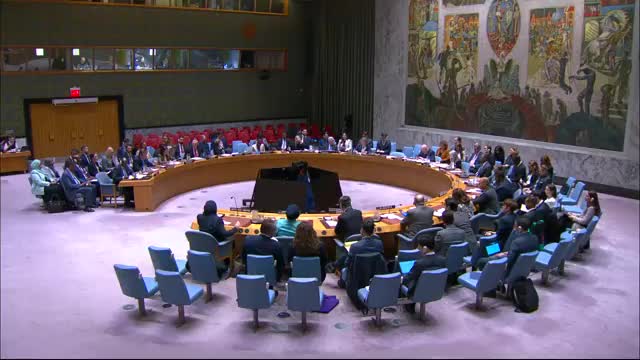UN representative warns of mass atrocities in El Fasha, urges immediate access and funding for Sudan relief
Get AI-powered insights, summaries, and transcripts
Subscribe
Summary
Speaker 1, Representative, told the meeting that El Fasha "already the scene of catastrophic levels of human suffering, has descended into an even darker hell with credible reports of widespread executions after Rapid Support Forces fighters entered the city."
Speaker 1, Representative, told the meeting that El Fasha "already the scene of catastrophic levels of human suffering, has descended into an even darker hell with credible reports of widespread executions after Rapid Support Forces fighters entered the city." The speaker said women and girls were being raped and people were "mutilated and killed with utter impunity."
The representative said nearly 500 patients and their companions were reportedly killed in an attack on a maternity hospital and described "tens of thousands of terrified, starving civilians" fleeing, with most moving on foot toward Tawela. The speaker warned that those able to flee—"the vast majority women, children, the elderly"—faced extortion and violence along perilous routes.
The speaker detailed other incidents across Sudan, citing drone strikes on markets in Kab Kabia and Sarrafomra and fierce fighting in North Kordofan that has driven new displacement and hindered humanitarian access around El Obeid. He said five Sudanese Red Crescent volunteers were killed while supporting food distribution in Barra and three remained missing. A drone strike in Masroob on Oct. 17 was described as having killed "a large number of civilians, including a prominent tribal leader and other members of his group."
Describing the humanitarian response, the speaker said the humanitarian community reached 13,500,000 people in Sudan between January and August and announced a $20,000,000 release from the Central Emergency Response Fund "to scale up support in Tawela and across Darfur and the Corda Fans." The speaker added that this allocation "complements allocations from our Sudan humanitarian fund focusing on NGO partners and most importantly, the local responders who remain at the forefront of our efforts."
On access, the representative said requests for a humanitarian pause in El Fasha had been blocked by the Rapid Support Forces and that the UN had been constrained in deploying staff to areas of greatest need. He urged member states to "use your muscle to create genuine pressure" to secure access and to hold actors to account for where aid is being blocked. He also reported the expulsion of the World Food Programme's country director and emergency coordinator by Sudanese authorities, saying the expulsions were carried out "without explanation."
On funding, the speaker warned that "74% of our 2025 response plan is unfunded," that regional refugee response support was lower, and that the shortfall was forcing cuts: "Food rations being reduced by half, community kitchens closing without warning, pregnant women delivering babies without medical help." He said more than 24,000,000 people—"over 40%" of the population in affected areas—lack food to eat and that more than 4,000,000 people have sought safety in neighboring countries.
The speaker framed the crisis as a failure of protection and a failure of international will, saying the world had "failed an entire generation" and calling on the council and member states to stop arming the violence, insist on accountability for those committing atrocities, and ensure security guarantees for humanitarian operations. He closed with an appeal to honor foundational UN pledges to protect future generations and to act "with vigor, courage, honesty, collective purpose."
